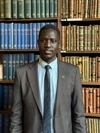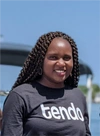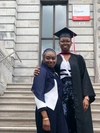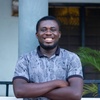Hamdi Mohamed
A Focus on Girl's Education
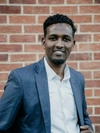
I was born and raised in the Dadaab refugee complex in Kenya, a place that has been my home for my entire life. My academic and leadership journey began in Dadaab, Kenya, where I completed my early education and earned the DAFI (Albert Einstein German Academic Refugee Initiative) Scholarship to study at the University of Nairobi. While pursuing my undergraduate degree, I co-founded a community-based organisation with fellow refugees to support education and empowerment in the camp. Driven by a commitment to gender equity, I launched the Somali Refugee Girls Education project. This initiative focused on helping girls in Dadaab stay in school and thrive. After graduation, I returned to the camp to expand this work, laying the foundation for what would become a broader movement for refugee-led development.
My journey to Oxford began with a spark of curiosity and initiative. During my undergraduate studies, I discovered a competitive online course in Refugee and Forced Migration Studies and was selected from over 900 applicants. Graduating with distinction, I became eligible for a mentorship program that introduced me to global scholarship opportunities. By the end of the program, I had secured multiple interviews, one of which led me to the Mastercard Foundation Scholars Program at Oxford. In 2023, I was accepted into a master’s program at Oxford University as a Mastercard Foundation Scholar, under the Africa Oxford Initiative (AfOx).
Arriving in Oxford that September was a transformative experience. Immersed in a global academic environment, I set out to expand my network, deepen my understanding of displacement, and sharpen my vision for refugee-led change. In May 2024, I had the opportunity to pitch the Somali Refugee Girls Education (SRGE) project at the Africa Oxford (AfOx) Conference, where I was selected as a finalist in the Innovation Showcase. Although I did not receive seed funding, I was honoured to be recognised by the Vice-Chancellor of the University of Oxford. That moment—Standing on stage as someone who once lived in Dadaab and experienced displacement—was a powerful reminder of how far I had come, and how much further I intend to go.
While at Oxford, I continued to lead from afar. Through the Mastercard Foundation Scholars Program’s Ubuntu service component, I partnered with Windle International Kenya to formalise a collaboration between their education programs and our refugee-led initiatives. This partnership aims to expand access to education for girls in Dadaab and strengthen local capacity.
One of the most meaningful aspects of my Oxford experience was the opportunity to challenge misconceptions about refugees. In class discussions, I often brought a lived perspective that was new to many of my peers. It was not always easy—some topics were deeply personal—but I saw it as my responsibility to represent the resilience and potential of displaced communities. Refugees are often portrayed as passive recipients of aid. I have worked hard to show that we are also leaders, innovators, and change-makers.
My journey has not been without challenges. I come from a patriarchal community where advocating for girls’ education is sometimes met with resistance. I have faced criticism and even threats. But I have also seen the transformative power of education first-hand. My wife, who only completed secondary school, supported our family during a difficult time when I lost my job. Her strength reinforced my belief that empowering women uplifts entire communities. At one point, my family experienced violence while I was away for my studies, which forced me to relocate them to a safer area. Balancing the safety of my family while continuing my mission has been challenging, but I have managed to navigate these difficulties with resilience and determination.
Despite the ambitions and energy to transform our community, refugees in Kenya—especially those in Dadaab—still face significant challenges. For example, refugees have no legal right or freedom of movement, which contravenes provisions of international refugee law. My legal status imposes constraints on my opportunities, as refugees in Kenya are not permitted to work legally or move freely outside the camps. Consequently, even with new qualifications, I would still lack the fundamental rights necessary to drive open and sustainable change in my community. This is why I, along with other refugee youth from Dadaab, are focused on creating opportunities for our fellow youth within the camp, where we can make a meaningful impact despite these restrictions.
A community-based organisation I co-founded to support fellow refugees in Dadaab, focused on girls’ education has over time evolved into the Somali Refugee Girls Education project. This initiative today supports over 200 girls through mentorship, tutoring, and offering school supplies. We operate under the Community Aid Network (CAN), a refugee-led organisation registered in Dadaab, and we have built a team of dedicated volunteers committed to transforming our community from within.
Completing my MSc in Refugee and Forced Migration Studies was a proud milestone—one that affirmed my commitment to using education as a tool for empowerment. While graduation was a moment of achievement, it also underscored the emotional cost of displacement. The absence of my family on that day was a quiet reminder of the inequalities that persist for many refugees. Yet, it is precisely these experiences that fuel my determination to lead, advocate, and create opportunities for others.
After completing my degree, I relocated to London on a graduate visa and began working with a charity organisation. Even now, I continue to advocate for refugee youth in Dadaab. On weekends, I meet with potential donors and build networks to support our work. One such connection led to a collaboration with the Inspire Us podcast, whose host, Alex, visited Dadaab and sponsored a football tournament. The event brought together local teams under the banner “End Gender-Based Violence,” using sport as a platform to engage boys in the movement for girls’ education.
Looking forward, I have both short-term and long-term goals. In the short term, I aim to pursue a PhD. I’m fascinated by research and want to deepen my expertise. In the long term, I plan to transform my refugee-led organisation into something that extends beyond Dadaab. I want it to become a force in the world, an example of how refugees can drive their solutions when given the chance.
I carry with me a simple conviction: refugees are perceived as weak, but we are not. We are people who have survived extreme hardship and have the drive to improve our lives. We need opportunities to prove ourselves and show what we are capable of.

